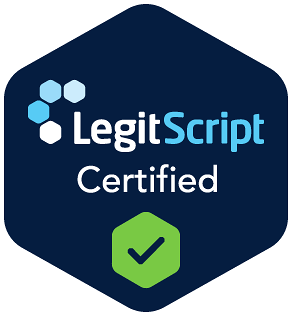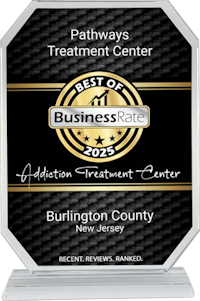PTSD and Addiction Recovery in Burlington, New Jersey
Trauma and addiction are closely linked. Our dual diagnosis program offers trauma-informed care to help individuals with PTSD manage flashbacks, anxiety, and substance use in a safe, supportive setting.
Post-Traumatic Stress Disorder (PTSD) is a serious mental health condition that often coexists with addiction. For many people, trauma leads them to seek relief through substances, creating a cycle of dependence that complicates both their mental health disorders and their ability to break free from addiction.
Understanding how PTSD and addiction are connected is crucial for effective recovery. In this guide, we will explore what PTSD is, its causes, how it can lead to addiction, and the steps toward healing both conditions.
PTSD and Addiction Recovery in New Jersey
What is Post Traumatic Stress Disorder?
 Post-Traumatic Stress Disorder (PTSD) is a psychiatric condition that can develop in individuals after they experience or witness a traumatic event. These events often involve actual or perceived threats to life, safety, or well-being. It is important to distinguish PTSD from acute stress disorder (ASD), which has similar symptoms but occurs shortly after a traumatic event and lasts no longer than four weeks. PTSD affects how the brain processes fear and stress, leading to a variety of mental, emotional, and physical symptoms.
Post-Traumatic Stress Disorder (PTSD) is a psychiatric condition that can develop in individuals after they experience or witness a traumatic event. These events often involve actual or perceived threats to life, safety, or well-being. It is important to distinguish PTSD from acute stress disorder (ASD), which has similar symptoms but occurs shortly after a traumatic event and lasts no longer than four weeks. PTSD affects how the brain processes fear and stress, leading to a variety of mental, emotional, and physical symptoms.
While PTSD is often associated with soldiers returning from combat, anyone who experiences trauma can develop the condition. It can occur after car accidents, physical assault, natural disasters, or emotional abuse. Trauma impacts people differently, and not everyone who experiences a traumatic event will develop PTSD. But for those who do, the condition can be life-altering.
PTSD and Addiction Recovery in New Jersey
Causes of PTSD
The causes of PTSD are rooted in trauma. Traumatic events that may lead to PTSD include:
- Combat and military service: Regular exposure to life-threatening situations during military service is one of the most well-known causes of PTSD.
- Physical or sexual assault: Victims of violent crimes, domestic violence, or sexual abuse may develop PTSD.
- Accidents and injuries: Car accidents, workplace injuries, or natural disasters like earthquakes or floods may trigger PTSD after the fact.
- Childhood abuse or neglect: Childhood trauma, including emotional, physical, or sexual abuse, can have lasting impacts and may manifest as PTSD.
- Sudden loss or grief: The unexpected death of a loved one may trigger PTSD, especially when the circumstances are violent or distressing.
Trauma can lead to various mental disorders, all of which may complicate the individual’s mental health.
PTSD and Addiction Recovery in New Jersey
PTSD Symptoms
The symptoms of PTSD can vary widely from person to person, but they generally fall into four categories:
- Intrusive memories: People with PTSD often experience flashbacks, nightmares, or unwanted thoughts about the traumatic event. These memories can be vivid and distressing, making it hard to focus on daily life.
- Avoidance: A person with PTSD may go out of their way to avoid people, places, or situations that remind them of the trauma. This can lead to isolation and withdrawal from family and friends.
- Negative changes in mood and cognition: PTSD can cause feelings of hopelessness, detachment, and emotional numbness. People with PTSD may lose interest in activities they once enjoyed and have difficulty forming or maintaining close relationships.
- Hyperarousal: Those with PTSD may be on edge, easily startled, or always on high alert for danger. This can lead to difficulty sleeping, irritability, or angry outbursts.
Not all symptoms will present in someone with PTSD. Some people may experience delayed symptoms, or different severity of symptoms depending on the day. Others may experience complex PTSD (C-PTSD), which comes as a result of prolonged trauma and may affect memory. A medical professional can help a person determine if they have PTSD and how it may present in their lives.
PTSD and Addiction Recovery in New Jersey
Challenges of Healing from Addiction with PTSD
Recovering from addiction is already a complex and difficult process, but when PTSD and other mental health disorders are involved, the challenges multiply. Here are a few reasons why healing from addiction while managing PTSD can be particularly tough:
- Self-medication: The desire to use substances to numb the emotional pain and distress caused by PTSD is strong. This can lead to a cycle of addiction where the person feels they need substances to survive emotionally.
- Heightened stress response: PTSD causes the brain to remain in a constant state of alertness, or “fight or flight.” This constant stress makes it harder for individuals to focus on recovery, as they are always battling underlying anxiety and fear.
- Relapse triggers: Trauma-related triggers, such as specific sounds, places, or situations, can provoke PTSD symptoms and lead to relapse if not properly managed.
- Difficulty trusting others: PTSD often makes it hard for individuals to trust others, including counselors or support group members, which can hinder progress in addiction recovery.

PTSD and Addiction Recovery in New Jersey
How PTSD and Substance Abuse Are Connected
The connection between PTSD and addiction is strong, often forming a vicious cycle that is hard to break without professional help. Many people with PTSD turn to drug abuse or alcohol as a way to cope with their distressing symptoms. This is known as self-medication, where substances are used to numb the emotional pain, anxiety, and insomnia caused by PTSD.
Signs of Addiction
Recognizing addiction in someone with PTSD can be challenging because the symptoms of substance use may overlap with PTSD symptoms. However, there are certain signs to watch for that may indicate addiction:
- Increased tolerance: The person needs to use more of the substance to achieve the same effects.
- Withdrawal symptoms: When the person is not using the substance, they may experience withdrawal symptoms such as cravings or shaking.
- Neglect of responsibilities: The person begins to neglect work, school, or family obligations in favor of substance use.
- Loss of interest in activities: The person loses interest in hobbies, social activities, or other things they once enjoyed, instead focusing on their substance of choice.
- Spending time and resources to obtain substances: If someone is spending the majority of their time and an increasing amount of their money to obtain addictive substances, that is typically a sign that they’re suffering from addiction.
- Continued use despite consequences: The person continues to use the substance despite the fact that their use is causing problems like legal issues, financial trouble, or relationship breakdowns.
This combination of PTSD and substance use disorder (SUD) is known as a dual diagnosis. Individuals suffering from both conditions face unique challenges because each condition may exacerbate the other. This informs and can shift priorities within treatment.
PTSD and Addiction Recovery in New Jersey
Treatment for PTSD and Addiction
Effective treatment for PTSD and addiction requires a multifaceted approach that addresses both conditions simultaneously. Cognitive-behavioral therapy (CBT) and exposure therapy are commonly used to help individuals process and manage PTSD symptoms. These therapies focus on changing negative thought patterns and gradually exposing individuals to trauma-related memories in a controlled environment, reducing their power over time.
Behavioral therapies, such as contingency management and motivational interviewing, are also effective in treating substance use disorders. These therapies help individuals develop coping strategies, set achievable goals, and stay motivated throughout their recovery journey.
Trauma-Informed Treatment Approaches
Trauma-informed care focuses on empowering individuals, promoting self-awareness, and encouraging self-regulation and self-motivation. Therapy modalities such as cognitive-behavioral therapy (CBT), eye movement desensitization and reprocessing (EMDR), and trauma-focused CBT are commonly used in trauma-informed care. These help individuals process traumatic memories, reduce their emotional impact, and develop healthier coping mechanisms. By prioritizing emotional regulation and providing a supportive environment, trauma-informed treatment approaches can significantly enhance the recovery process.
Recovery and Relapse Prevention
Recovery from PTSD and addiction is a long-term commitment that requires ongoing effort and support. Relapse prevention strategies are essential for maintaining recovery and avoiding setbacks. Identifying triggers, developing coping skills, and building a robust support network are key components of a successful relapse prevention plan.
Ongoing therapy and support groups provide continuous support and accountability, helping individuals stay on track with their recovery goals. For some, spending time in a sober living program provides a stepping stone and helpful support network before entering the post-rehab world.
PTSD and Addiction Recovery in New Jersey
Heal from PTSD and Addiction at Pathways Treatment Center
At Pathways Treatment Center, we understand the unique challenges of healing from PTSD and addiction. We specialize in treating individuals with a dual diagnosis, offering comprehensive care that addresses both conditions simultaneously. Our goal is to help you break the cycle of substance abuse and trauma so that you can lead a healthy, fulfilling life.
If you or a loved one is struggling with both PTSD and addiction, Pathways Treatment Center can help. We provide compassionate, evidence-based care that addresses the root causes of both conditions. Our team is dedicated to helping you reclaim your life from the grip of trauma and substance abuse. Reach out to us today to learn more about our programs and take the first step on your journey to healing.



